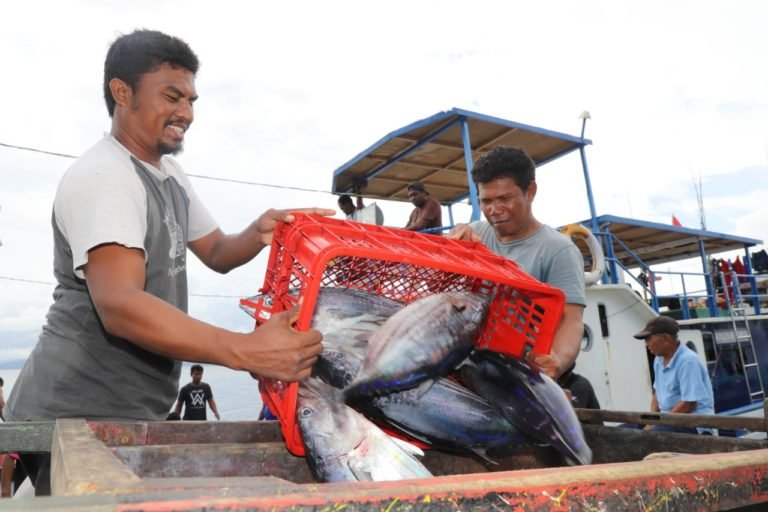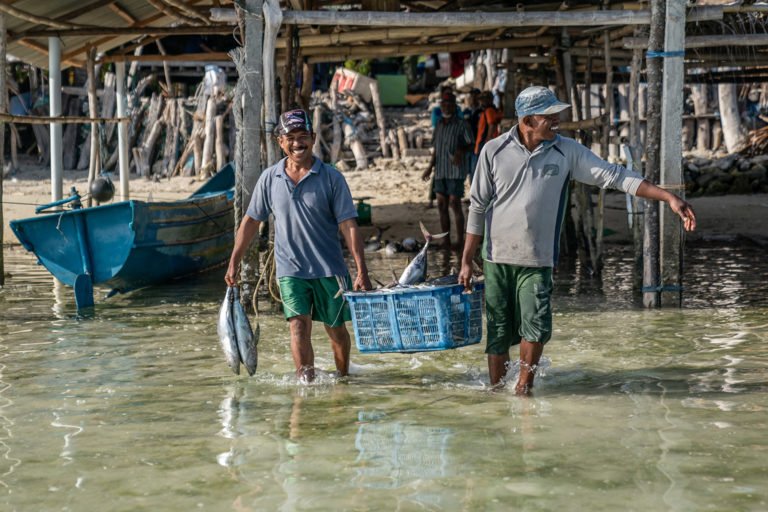- The Indonesian government will issue a decree that manages the country’s marine fisheries based on capture quotas, prompting concerns from experts that the new strategy may threaten the sustainability of fish stocks.
- Several marine observers note that more than half of fishing zones in Indonesia are already “fully exploited.”
- They also take issue with the small portion of the quota reportedly being allocated for traditional and small-scale fishers, warning of a widening income gap and social conflicts as a result.
- Indonesia’s wild capture fisheries employ around 2.7 million workers; the majority of Indonesian fishers are small-scale operators, with vessels smaller than 10 gross tonnage.
JAKARTA — The Indonesian government will issue a decree that manages the country’s marine fisheries based on capture quotas, but experts have raised concerns that this new approach may threaten the sustainability of the country’s fish stocks.
The fisheries ministry said it expects to issue a government regulation on quota-based fisheries management in July, after receiving the green light from the office of President Joko Widodo. In part, the new policy is aimed at boosting state revenue from the fisheries sector. The nationwide decree will come into effect in stages across the various fisheries zones in Indonesia, said a top official at the ministry.
“One thing’s for certain, and that is the government regulation will happen because we’re really thinking long-term with it, and that ecology takes precedence,” Antam Novambar, the ministry’s secretary-general, told Mongabay in a press briefing on June 21.
“Only fools would oppose this,” he added.
Indonesia is the second-biggest marine capture producer, after China, harvesting 84.4 million metric tons of seafood in 2018, according to the U.N.’s Food and Agriculture Organization (FAO). The country’s waters support some of the highest levels of marine biodiversity in the world, and the fisheries industry employs about 12 million Indonesians.
Mongabay has yet to review the draft decree, but available information shared publicly by the ministry over the past year suggests the biggest difference is that the new strategy would allocate a maximum limit out of the annual total allowable catch (TAC) to every fishing stakeholder from traditional and small-scale to large and even hobbyists. The current strategy mandates that every stakeholder is allowed to catch as much fish as they want as long as the total capture doesn’t exceed the TAC, which is capped at 80% of the estimated fish stock.
Some reports have mentioned that industrial fishers would get up to 60% allocation, while the remainder would be given to traditional and small fishers (20%), research (10%), and hobby and tourism (10%). Industrial fishers are also expected to help develop or revamp fish ports and facilities.
“Many [foreign] investors have expressed interest in investing in Indonesia’s marine capture fisheries sector,” Muhammad Zaini Hanafi, the ministry’s director-general of marine capture fisheries, said on June 30 at the United Nation Oceans Conference taking place in Lisbon. “This is a great opportunity, but we’re still prioritizing fishing investors in the country.”
He said investors have been allocated 5.6 million metric tons of fish in four industrial fishing zones, namely parts of the North Natuna Sea, Aru Sea, parts of the Arafura and Timor Sea, and parts of the Indian Ocean. He estimated the production value could reach 180 trillion rupiah ($12 billion), with revenue to the government at a tenth of that figure.
Indonesia’s wild capture fisheries employ around 2.7 million workers; the majority of Indonesian fishers are small-scale operators, with vessels under 10 gross tonnage. Under the business-as-usual scenario, capture fisheries is projected to expand at an annual rate of 2.1% from 2012 to 2030.
The new regulation also seeks to further divide Indonesia’s fisheries management areas (WPP) into zones for traditional and small-scale fishers, large fishing vessels, and conservation efforts, such as spawning and nursery grounds. It will also regulate harvest quotas for each type of fish, the number of boats, landing ports, fishing periods, and the kinds of gear allowed in each fishing zone.
Another key change proposed in the regulation is having a contract system between the ministry and a fishing company, allowing the company to control the zone for 15 years with the option for an extension of another 15 years. Foreign capital and foreign-made fishing vessels are also expected to be welcomed back into Indonesian waters with the issuance of the new regulation.
Many marine observers, however, have spoken out against the new strategy, saying it would threaten the sustainability of the country’s fish stocks, especially when more than half of the fisheries management areas are already fully exploited, indicating that more stringent monitoring is required.
A dedicated fishing zone for industrial-scale fishers would significantly increase the exploitation pressure on the resources in that particular area, Hendra Sugandhi, head of the livestock and fisheries division at the Indonesian Employers’ Association (Apindo), wrote in an op-ed published April 26.
“The quota-based fisheries management with contract system must be reviewed because it will very much threaten the sustainability of the fish resource,” he said.
Some experts have also taken issue with the small portion allocated for traditional and small-scale fishers. They warn of unfair competition and increasing wealth inequality arising from this policy.
“This planned policy is loaded with problems and prone to create socioeconomic conflicts, and can spark a looting of the fish resources because of poor integrity and monitoring capacity,” the Coalition for Just and Sustainable Fisheries and Marine (KORAL), an NGO, said in a press release in March.

FEEDBACK: Use this form to send a message to the author of this post. If you want to post a public comment, you can do that at the bottom of the page.











